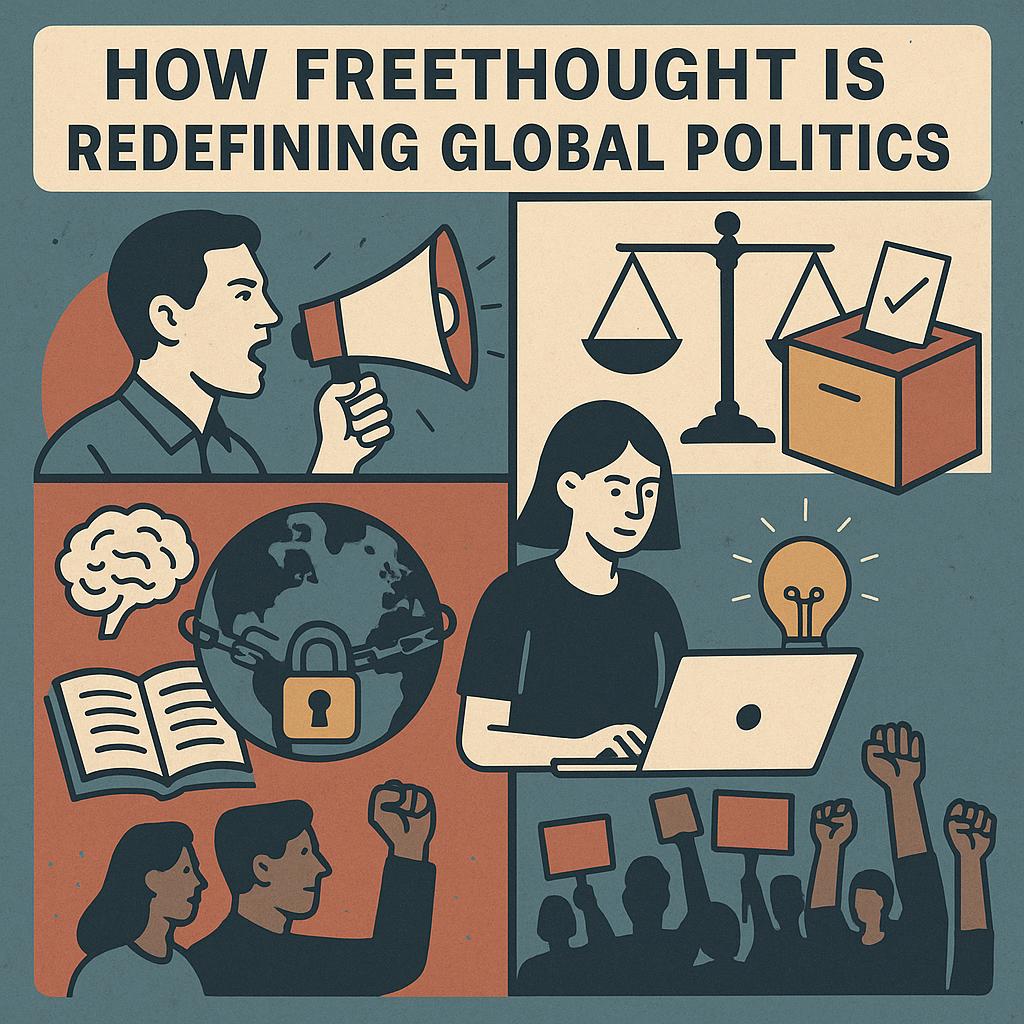They say, “We can’t have freedom of speech in Europe. We’re not America.” But how can anything change if we are punished for even saying that? How do we reform injustice if questioning it is illegal?
Freethought today is no longer academic. It is revolutionary. Across borders, thinkers challenge systems—not with weapons, but with ideas. Many of these ideas are misunderstood. Some are banned. Others are simply ignored by the media. But they are shaping the world anyway.
Thought as a crime
In many places, expressing an honest opinion can destroy your life. Even in democracies, dissidents are fined, fired, or imprisoned. Not for violence. But for what they say. Or write. Or believe.
In Belarus or Egypt, you may be tortured. You will be prosecuted in France or Germany for hate speech, even if your words involve no hate. In Hungary, Poland, or Turkey, courts silence critics with lawsuits or censorship.
This is not freedom. It is fear disguised as law.
What freethought actually means
Freethought means thinking without fear. It means using reason instead of tradition. Evidence instead of dogma. Doubt instead of blind faith. Freethinkers are not radicals. They are honest. They question everything—religion, capitalism, nationalism, and authority itself.
But that honesty scares people in power.
Smarter democracy still rejected
Freethinkers do not just criticize. They create. Many propose better democratic systems. Yet most people have never heard of them. Here are three key examples:
– Approval voting: You can vote for all candidates you like, not just one. This reduces vote splitting and polarization.
– Sortition: Lawmakers are chosen by random lottery, like jury duty. This avoids career politicians and reduces corruption.
– Quadratic democracy: People vote on issues, but pay “credits” for each vote. If you care deeply, you spend more. This makes public decisions reflect passion, not just numbers.
These systems are tested. They are logical. They could replace our outdated elections. But they do not serve elites. So they are ignored.
When parties try and fail
Some freethinkers enter politics. Parties like the Czech Pirates or Spain’s Podemos tried to fight clientelism and digitize government. At first, they made noise. Then came sabotage. Media distortion. Internal chaos. Bureaucratic resistance.
Eventually, they faded. They learned that ideas alone cannot survive in a corrupt system. The machine swallows everyone who plays by its rules.
Building systems outside the system
So, freethinkers change tactics. Instead of fighting the state, they bypass it. They build alternatives:
– DAOs (Decentralized Autonomous Organizations) run online communities without leaders
– Blockchain replaces banking trust with transparent code
– Encrypted platforms protect privacy from surveillance
These are not dreams. They exist. Protest becomes software. Governance becomes code. Freethought becomes architecture.
Freethought: Education becomes rebellion
Freethinkers also build schools. Not for grades. But for thinking. They teach logic, science, evolutionary psychology, and ethics. In Iran, these lessons are illegal; in Russia, they are dangerous. In the West, they are often discouraged.
Real education does not tell you what to think. It shows you how. And that is enough to break any system.
Global minds, no borders
Freethinkers work across countries. They meet in secret chats, encrypted networks, and anonymous platforms, they leak classified documents. And they write banned essays. They rescue exiled journalists. They do what no government dares to do—tell the truth without permission.
Platforms like Freethinkers International offer legal aid, translation, and visibility. Truth becomes collaborative. Censorship becomes harder.
Economic alternatives no one tells you about
Most people believe we must choose between capitalism and communism. Freethinkers say: choose neither. Build better.
– Universal Basic Income gives every person a fixed income, no matter their job. It replaces poverty traps with dignity.
– Post-growth economics questions whether endless GDP growth is even sane.
– Platform cooperatives give workers ownership of the apps and systems they use daily.
These models already exist in pilot projects. But they remain invisible in mainstream debate. Why? Because they shift power from the top to the bottom.
Poverty crushes ideas
Even the smartest ideas die when no one can afford to speak them. In poor countries, hunger and fear silence thinkers. In rich ones, debt and burnout do the same. Rent, bills, and hopelessness become quiet censors.
This is how the system wins—by exhausting anyone who questions it.
Controlling the narrative
Media should challenge power. Instead, it often protects it. Politicians lie. Journalists repeat. Wikipedia erases. Platforms ban. “Disinformation” becomes whatever challenges authority.
So freethinkers use podcasts, encrypted blogs, satire, and underground art. They bypass the gatekeepers. They speak in formats that cannot be deleted.
Rationality as resistance
Freethought is not just opinion. It is method. It uses:
– Bayesian reasoning to update beliefs based on evidence
– Steelmanning, which means stating opponents’ views as clearly as possible
– Epistemology, the study of what we can truly know
In a world of noise, freethought demands precision. It replaces slogans with understanding.
Humor and symbols as weapons
Memes, jokes, and art spread faster than manifestos. A good joke can destroy a tyrant’s dignity. Satire makes power look weak. Symbolic acts expose hypocrisy.
That is why regimes fear ridicule more than rebellion.
Even tyrants steal ideas
Here is the irony: dictators borrow from freethinkers. Iran tried basic income. China uses algorithmic courts. Russia copies Western media formats. These regimes pretend to modernize. But behind the lies, they admit one truth—freethought works.
Sometimes, even fake reforms create real cracks.
Freethinking: Beyond nations, into networks
Borders matter less. Systems lose trust. Institutions rot. What survives are networks of ideas—shared between minds that refuse to submit. These minds challenge old ideologies. They question every rule. And they build new ones without asking for permission.
The future may not belong to nations. It may belong to thought.
Final words
Freethinkers are not saints. They are not always right. But they ask better questions. They think where others obey. They speak when others are silent.
And that is enough to change everything.

Leave a Reply